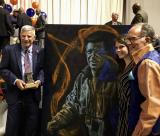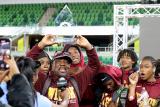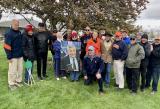Folders |
Former Illini Athletes Pay Respects at Gary Wieneke Memorial MeetPublished by
Legendary Illinois Coach, Who Died In 2021, Built Powerful Teams Around 800-Meter Mastery By David Woods for DyeStat Photos courtesy University of Illinois, Jeff Jirele and David Woods CHAMPAIGN, Ill. – As a coach, Gary Wieneke was something of a paradox. Stoic in manner, he induced lifelong devotion from his University of Illinois runners. Old-school in approach, he not only accepted but cared about their individual quirks. “He could tune you like a musical instrument. He certainly did that for me,” said Rob Mango, a half-miler from the 1970s. Mango was among Illinois track alumni gathered Saturday at two-year-old Demirjian Park for the inaugural Gary Wieneke Memorial meet. Wieneke, who coached the Illini from 1967-2003, died July 8, 2021. He was 83. “I think he would appreciate it, even though he was such a humble guy,” said Wieneke’s widow, Peggy Gates-Wieneke. “I think the whole family really appreciates that the university has done this.” In a pre-meet ceremony on the Illini golf course in nearby Savoy, some of Wieneke’s ashes were spread on what was once the home cross-country course. On a wintry, blustery April day, there was a feeling of warmth for the coach and his legacy. Wieneke coached Craig Virgin, a three-time Olympian and two-time world cross-country champion. An example of the coach’s restraint was his reaction to Virgin’s 1975 NCAA cross-country victory: a handshake. That’s it. “He was a ‘John Wayne’ kind of a coach who didn’t show his emotions,” Virgin said. In Virgin’s final college meet, he ran in the 1977 NCAA Championships at Champaign. The track then was in Memorial Stadium, where football legend Red Grange once roamed. “It was symbolic and kind of a high-water mark for our program and the community support that track and field and cross-country once enjoyed here at the University of Illinois,” Virgin said. “For me, it was a storybook ending.” Start of Wieneke’s tenure coincided with Illinois athletics climbing out of a slush fund scandal. When the underdog Illini won the Big Ten outdoor title in 1975, it was their first conference championship in any sport (except fencing) since 1963. It was a long slide from a 1950s decade of dominance: seven of 10 Big Ten outdoor titles. Wieneke pulled the Illini from the mud. Born Nov. 13, 1937, in Cedar Rapids, Iowa, he grew up in East Moline, Ill. After high school graduation, he enlisted in the Army. He then enrolled at Augustana College, where he was a half-miler. While coaching at Rockford (Ill.) Guilford High School, he caught the attention of Illini coach Bob Wright, who hired him as an assistant. Then it was on. Wieneke coached Illinois to 12 Big Ten championships: six outdoors, five indoors, one cross country. The 1984 cross country title is Illinois’ only one since 1947. His Illini won four NCAA indoor team trophies by finishing in the top four, and in 1988 they almost interrupted what became Arkansas’ 12-year streak (Illinois was second, 34-29). From 1976-1995, Illinois had more national indoor trophies (four) then the rest of the Big Ten combined (three). Even when the Illini did not win, they nearly did. In 22 Big Ten track meets from 1985-95, Illinois was in the top three 20 times. In 43 conference meets since 2001, the Illini have finished higher than third just four times. “He was a very reticent man, didn’t have much to say,” said Mike Durkin, who made Olympic teams in the 1,500 in 1976 and 1980. “That made you work hard to get a compliment from him. “He was a man I grew to love. Over the years, we were able to exchange that verbally. ‘I love you.’ He was a great influence on my life. I certainly would not have had the career I had without his tutelage. He became the string that attached my lifetime friends from the track program. We remain friends to this day.” Virgin and Durkin are part of a texting chain of 14 former Illini who interact almost daily. Wieneke was an Einstein of the 800 meters. That was signaled when the young coach’s Illini tied the world indoor best of 7:19.8 in the two-mile relay at the Houston Astrodome in 1972. Splits: Mango 1:51.9, Dave Kaemerer 1:49.8, Lee LaBadie 1:46.7, Ron Phillips 1:51.4. Remarkably, a half-century later, the converted 7:17.3 in the 4x800 by Illinois (and 1971 Wisconsin) remain the fastest in collegiate history. The Illini were so deep that on the same day as the world record, back in Champaign, Durkin set a school record for 1,000 yards. Yet the freshman could not crack the relay lineup. There is a straight line from Wieneke to LaBadie to Clayton Murphy. LaBadie, the first Big Ten undergraduate to run a sub-4-minute mile, coached Murphy to a 2016 Olympic bronze medal in (what else?) the 800 meters. Likewise, there is a direct line from Wieneke to Durkin to Jim Spivey. Durkin, an attorney, and another Chicagoan, Ken Popejoy, became co-coaches for Spivey, an Indiana University Olympian who won a 1,500 bronze medal at the 1987 World Championships. Marko Koers, a three-time Dutch Olympian, won six Big Ten 800 titles (four outdoors, two indoors) while at Illinois. And he won three NCAA titles (indoor 800 in 1993, outdoor 1,500 in 1993 and 1996). It wasn’t all the same half-milers padding Wieneke’s total. He coached 11 different half-milers to 27 Big Ten titles. In a 10-year span from 1992-2001, Illini runners won the Big Ten outdoor 800 eight times. Phillips and Mango were second in the 800 at outdoor NCAAs in 1972 and 1973, respectively. Phillips’ Big Ten record of 1:45.3 – set in finishing fifth at the 1972 Olympic Trials – lasted until Koers clocked 1:44.84 in 1993. Mango, a New York City painter and sculptor, said Wieneke let him be himself. “He created either boundaries or absence of boundaries to let you expand naturally,” Mango said. “There were times I showed up at the track, and he’d say, ‘Bojo, why don’t you just go home?’ And as you know, he could put on some of the toughest workouts in the history of middle-distance running. I was the type of guy, being an artist, my mind was often in other places. “In a nutshell, I think Wieneke’s ability was to find those buttons and keys and operate them and influence you as a performer through that.” The coach sometimes did so with those outside his own expertise. Such athletes included Charlton Ehizuelen, a four-time NCAA champion from Nigeria. In 1975, he long jumped within 1.25 inches of Bob Beamon’s world indoor record of 27-2.75 in the Big Ten meet at Bloomington, Ind. Later that year, Ehizuelen nearly pulled out of outdoor NCAAs at Provo, Utah. “Coach Wieneke noticed I was icing my knee. I wanted to quit,” said Ehizuelen, who remains a U.S. resident. “‘You can’t quit because you know you’re not a quitter.’ Listening to him, I took my last jump and won NCAAs and set a new (meet) record.” Wieneke wasn’t a quitter, either. After retiring from Illinois, he was persuaded to coach girls cross country at Unity High School, Tolono. Ill. He began with three runners. He coached there from 2006 through spring 2015. After his second retirement, Unity girls that fall won the first of their four Class 1A state championships. Just as he did at Illinois, Wieneke tuned what had been a clanging cymbal into a symphony. Contact David Woods at [email protected]. Follow him on Twitter: @DavidWoods007. More news |










